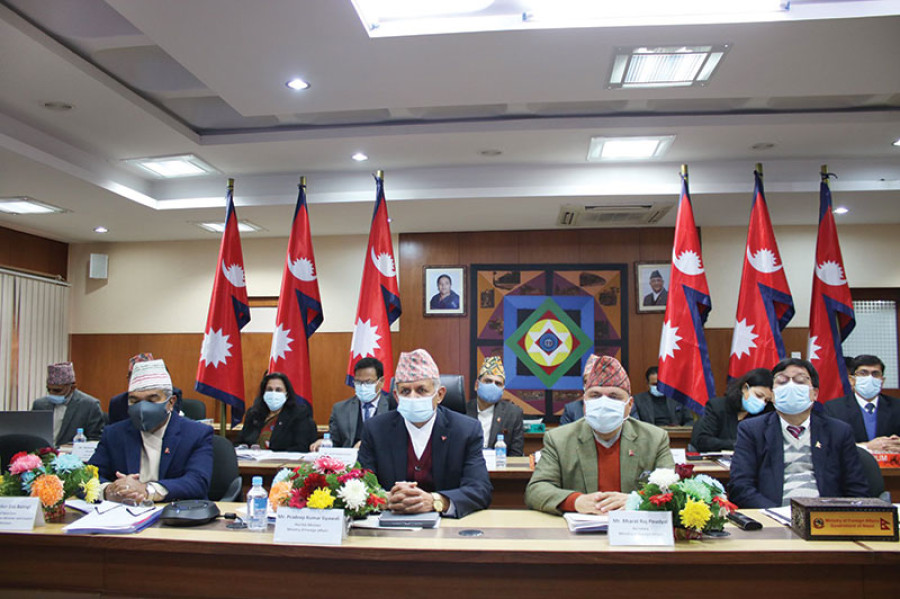National
Universal Periodic Review: Nepal quizzed on transitional justice, rights, Tibetan refugee issue
Foreign Minister Gyawali reiterates Nepal’s commitment to human rights, deflects US queries on Nepal-China agreements as a bilateral matter.
Anil Giri
Nepal fielded questions related to the country’s transitional justice process, human rights situation and refugees’ status, among others, at the 37th Session of the Human Rights Council’s Universal Periodic Review Working Group.
The Ministry of Foreign Affairs on Thursday said Foreign Minister Pradeep Gyawali-led team replied to the concerns raised by the member nations at the session that was held virtually.
Ahead of the session, some member nations, including the United States of America, had submitted advance questions, mainly related to Nepal’s unfinished transitional justice process, human rights record, refugees and some legislative bills that critics have deemed restrictive and impinges upon freedom of press and expression.
Foreign Minister Gyawali and Chief Secretary Shanker Dai Bairagi were among the team representing Nepal that answered to the queries raised during the session.
The issue of transitional justice was prominently raised by several countries at the session, particularly about Nepal’s international obligations on war crimes and the 2015 Supreme Court verdict on amending the laws governing the transitional justice law so that grave crimes are duly and justly punished.
Nepal has still not amended the transitional justice laws in line with the 2015 Supreme Court verdict that states the current laws do not fully conform to Nepal’s international obligations.
“In response, Foreign Minister Gyawali said Nepal government was steadfast in its commitment that there would be no blanket amnesty in cases of serious violation of human rights,” an official at the Foreign Ministry said.
Gyawali aslo underscored that Nepal’s peace process was guided by the Comprehensive Peace Accord, the directives of the Supreme Court and relevant international commitments, concerns of the victims, and the ground realities, the official said.
On the status of Tibetan refugees in Nepal who lack proper documentation to work and access services, a concern raised by the US, Nepal said that the country was hosting the refugees on humanitarian grounds.
“We have not reached any additional agreement on refugees,” Gyawali told the session.
Since Nepal is not a signatory to the UN Refugee Convention, the Nepal side said that the country was upholding the UN-led gentlemen’s agreement to provide safe passage to the Tibetan refugees to travel up to Dharamshala, India.
“We are committed to what we have done with the refugees living inside our country and as per the humanitarian ground. Our policy towards the refugees living inside the country is the same and will remain the same,” Gywali said.
On the issue of non-refoulement of Tibetan refugees, Chief Secretary Bairagi told the session that Nepal had committed not to send back genuine asylum seekers or refugees to their country of origin in case their lives are in danger.
“We are truly honoring the commitment we have made in various international forums on the issue of non-refoulement,” Bairagi told the session.
The US also had a question related to some agreements signed between Nepal and China during the State Visit of Chinese President Xi Jinping to Nepal in October, 2019, mainly the Borders System Management Agreement and Mutual Legal Assistance Treaty.
On the US concern on the proposed extradition treaty with China which was dropped after protests from several international quarters.
To these queries, Nepal replied by saying that those were bilateral agreements between Nepal and China.
Nepal also faced queries concerning some of the proposed legislations, such as the Media Council Bill, Information Technology Bill, and the Mass Communications Bill, that have been deemed restrictive and shrinks media freedom and curtails free speech.
Countries like the United Kingdom, Northern Ireland and Belgium asked Nepal about the status of freedom for religion or belief, investigation mechanism to probe and prosecute misconducts and human rights violations committed by the law enforcement agencies and security bodies, discrimination against minority and marginalised groups.
To these queries, Nepal responded by reiterating its commitment to the promotion and protection of human rights and rule of law.
“Nepal believes in universality, indivisibility, interdependence, interrelatedness, and mutually reinforcing nature of human rights, including the right to development,” Foreign Minister Gyawali said.
The Nepal government had submitted a 26-page long report at the UN human rights working group on the universal periodic report.
Nepal seems to have prepared well for the review and presented most of the important issues, said Santosh Sigdel, a lawyer following the ongoing session.
“Nepal in general is good in adopting laws, policies, protocols but the problem is implementation of those laws and policies,” he said.
“For example, it highlighted how inclusive the constitution is, how inclusive and representative the elections were but shied away reflecting on what it has been doing to address the grievances of the people on issues ranging from discriminatory laws in the constitution.”
Sigdel said Nepal’s response and language towards how it has been addressing the issue of transitional justice system was “sloppy just highlighting the number of complaints registered in the two commissions related to transitional justice”.
“While in reality, we know the two commissions are toothless,” added Sigdel.




 13.12°C Kathmandu
13.12°C Kathmandu














